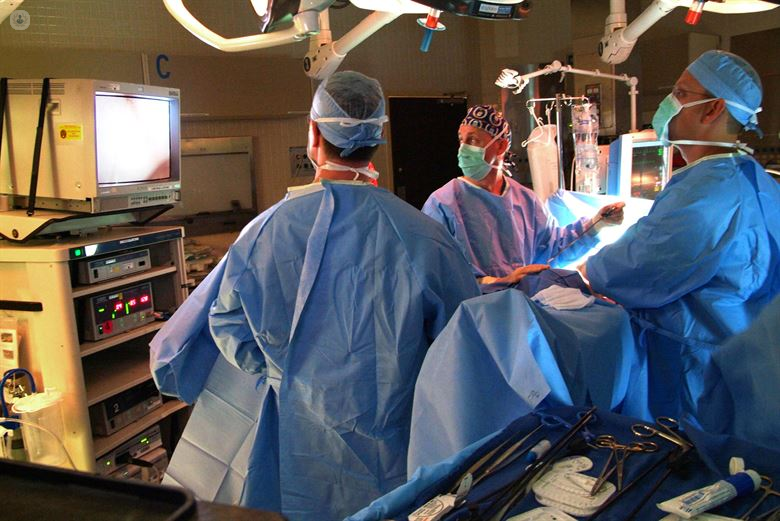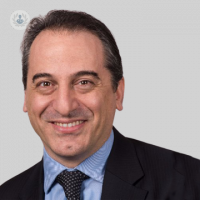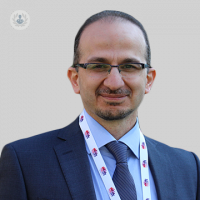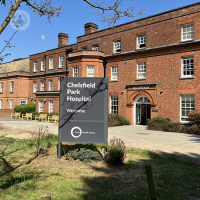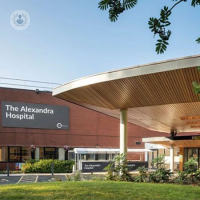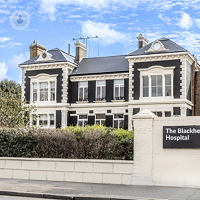What is a gastric bypass?
Gastric bypass surgery is a type of bariatric surgery. Bariatric surgery aims to reduce the patient’s food and/or calorie intake via operations on the upper digestive system (particularly the stomach), which physically and psychologically affect the patient’s approach to food. A gastric bypass involves dividing the stomach into two “pouches”, and connecting the smaller top pouch directly to the small intestine, allowing food to “bypass” most of the stomach. This means that fewer calories are absorbed by the stomach, and due to the smaller space, the patient feels full quicker. As a consequence, they eat less.
When is gastric bypass surgery indicated?
Gastric bypasses are used to treat a variety of conditions which require the patient to eat less or reduce calorie intake. It is commonly used as a weight loss treatment for morbid obesity, although surgery is rarely the first option – major operations carry risks, and can be expensive, so trying to lose weight via exercise and dietary changes is usually the first port of call. If this doesn’t help you to lose weight, your doctor might discuss surgical options, such as a gastric bypass.
Other conditions that could warrant a gastric bypass include type 2 diabetes, sleep apnoea and hypertension. Long-term mortality of gastric bypass patients has been shown to be reduced by 40%.
What does gastric bypass surgery involve?
The amount of food a patient can eat is limited by creating a small pouch in the upper stomach and dividing it from the rest of the stomach. This can either be done by creating a partition (which runs the risk of the stomach healing and returning to its pre-operative function) or by totally separating the two parts. The small intestine is reconstructed so that both parts of the stomach drain into it, rather than just from the bottom of the stomach.

The surgery is often laparoscopic, i.e. using small incisions to insert a small camera and specialised surgical equipment to perform the operation without cutting the patient open.
How long does it take to recover from gastric bypass surgery?
If the surgery is done laparoscopically, the patient may stay in the hospital for 2-3 days, and should be fully recovered in 3-5 weeks. Recovery time will be longer if open surgery is performed.
How much weight will you lose after a gastric bypass?
On average, following gastric bypass surgery patients lose 60% of their extra weight. Studies have shown it also significantly reduces the risk of impaired glucose tolerance (IGT) progressing to type 2 diabetes.
01-07-2013 05-23-2023Gastric bypass
Professor Francesco Rubino - Surgery
Created on: 01-07-2013
Updated on: 05-23-2023
Edited by: Sophie Kennedy
What is a gastric bypass?
Gastric bypass surgery is a type of bariatric surgery. Bariatric surgery aims to reduce the patient’s food and/or calorie intake via operations on the upper digestive system (particularly the stomach), which physically and psychologically affect the patient’s approach to food. A gastric bypass involves dividing the stomach into two “pouches”, and connecting the smaller top pouch directly to the small intestine, allowing food to “bypass” most of the stomach. This means that fewer calories are absorbed by the stomach, and due to the smaller space, the patient feels full quicker. As a consequence, they eat less.
When is gastric bypass surgery indicated?
Gastric bypasses are used to treat a variety of conditions which require the patient to eat less or reduce calorie intake. It is commonly used as a weight loss treatment for morbid obesity, although surgery is rarely the first option – major operations carry risks, and can be expensive, so trying to lose weight via exercise and dietary changes is usually the first port of call. If this doesn’t help you to lose weight, your doctor might discuss surgical options, such as a gastric bypass.
Other conditions that could warrant a gastric bypass include type 2 diabetes, sleep apnoea and hypertension. Long-term mortality of gastric bypass patients has been shown to be reduced by 40%.
What does gastric bypass surgery involve?
The amount of food a patient can eat is limited by creating a small pouch in the upper stomach and dividing it from the rest of the stomach. This can either be done by creating a partition (which runs the risk of the stomach healing and returning to its pre-operative function) or by totally separating the two parts. The small intestine is reconstructed so that both parts of the stomach drain into it, rather than just from the bottom of the stomach.

The surgery is often laparoscopic, i.e. using small incisions to insert a small camera and specialised surgical equipment to perform the operation without cutting the patient open.
How long does it take to recover from gastric bypass surgery?
If the surgery is done laparoscopically, the patient may stay in the hospital for 2-3 days, and should be fully recovered in 3-5 weeks. Recovery time will be longer if open surgery is performed.
How much weight will you lose after a gastric bypass?
On average, following gastric bypass surgery patients lose 60% of their extra weight. Studies have shown it also significantly reduces the risk of impaired glucose tolerance (IGT) progressing to type 2 diabetes.


"Why this is the best weight loss surgery for you – what I would choose for you as your obesity surgeon”
By Mr Ali Alhamdani
2024-12-21
There are many different things which must be considered when deciding on the right path to follow for weight loss surgery. Top surgeon Mr Ali Alhamdani explains how he decides the best course of action and procedure for the patient. See more


Life after gastric bypass surgery: What to expect
By Mr Ahmed Hamouda
2024-12-21
Gastric bypass surgery requires significant lifestyle adjustments, starting with a strict fluid-only diet that gradually transitions to solids, while avoiding sweets to prevent complications. Recovery includes a brief hospital stay and a gradual return to activities. Though rare, complications can occur, including nutritional deficiencies. Regular exercise is essential for sustained weight loss, typically noticeable within the first year. In his latest online article, Mr Ahmed Hamouda explores the necessary dietary changes, recovery process, potential complications, and expected outcomes following gastric bypass surgery. See more


Gastric bypass surgery: how it is performed, side effects and results
By Mr Alistair Sharples
2024-12-21
A gastric bypass surgery can result in patients being better able to control their hunger and can also allow them to lose a large amount of excess weight. Here to offer us a comprehensive, expert overview of what the surgery involves is highly esteemed consultant surgeon, Mr Alistair Sharples. See more


Gastric bypass surgery: the advantages, procedure and potential risks
By Mr Sanjay Agrawal
2024-12-20
Mr Sanjay Agrawal, consultant surgeon specialising in bariatric surgery explains the pros and cons of gastric bypass surgery See more
Experts in Gastric bypass
-
Professor Francesco Rubino
SurgeryExpert in:
- Gastric sleeve
- Diabetes surgery
- Bariatric surgery
- Obesity
- Gastric bypass
- Gastric band
-
Mr Ali Alhamdani
SurgeryExpert in:
- Weight loss
- Bariatric surgery
- Gallbladder surgery
- Acid reflux
- Gastric bypass
- Endoscopy
-
Mr Majid Hashemi
SurgeryExpert in:
- Gastric sleeve
- Achalasia
- Acid reflux
- Hiatal hernia
- Gastric bypass
- Obesity surgery
-
Mr Bart Decadt
SurgeryExpert in:
- Obesity surgery
- Gastric sleeve
- Gastric band
- Gastric bypass
- Acid reflux
- Gallbladder surgery
-
Dr Antanas Mickevicius
SurgeryExpert in:
- Gastric bypass
- Gastric sleeve
- Upper GI surgery
- Acid reflux
- Hiatal hernia
- Bariatric surgery problems
- See all

Chelsfield Park Hospital - part of Circle Health Group
Chelsfield Park Hospital - part of Circle Health Group
Bucks Cross Rd, Chelsfield, Orpington BR6 7RG
No existe teléfono en el centro.
By using the telephone number provided by TOP DOCTORS, you automatically agree to let us use your phone number for statistical and commercial purposes. For further information, read our Privacy Policy
Top Doctors

The Alexandra Hospital - part of Circle Health Group
The Alexandra Hospital - part of Circle Health Group
Mill Ln, Cheadle, SK8 2PX
No existe teléfono en el centro.
By using the telephone number provided by TOP DOCTORS, you automatically agree to let us use your phone number for statistical and commercial purposes. For further information, read our Privacy Policy
Top Doctors

The Blackheath Hospital - part of Circle Health Group
The Blackheath Hospital - part of Circle Health Group
40-42 Lee Terrace, Blackheath, London SE3 9UD
No existe teléfono en el centro.
By using the telephone number provided by TOP DOCTORS, you automatically agree to let us use your phone number for statistical and commercial purposes. For further information, read our Privacy Policy
Top Doctors
-
Chelsfield Park Hospital - part of Circle Health Group
Bucks Cross Rd, Chelsfield, Orpington BR6 7RG, OrpingtonExpert in:
- Vascular Surgery
- Cardiology
- Colorectal surgery
- General Surgery
- Maxillofacial Surgery
- Orthopaedic surgery
-
The Alexandra Hospital - part of Circle Health Group
Mill Ln, Cheadle, SK8 2PX, CheadleExpert in:
- Hip
- Cardiology
- Shoulder and elbow
- Paediatrics
- Foot and ankle
- Knee
-
The Blackheath Hospital - part of Circle Health Group
40-42 Lee Terrace, Blackheath, London SE3 9UD, East LondonExpert in:
- Vascular Surgery
- Cardiology
- Bariatric Surgery
- Colorectal surgery
- Endocrine Surgery
- General Surgery
- See all
- Most viewed diseases, medical tests, and treatments
- Alzheimer's disease
- Nutrition
- Weight loss injections
- Nipple discharge
- Abdominal pain
- Endovenous laser treatment (EVLA)
- Minimal access surgery (keyhole surgery)
- Head and neck cancer
- Neck lump
- Bariatric surgery
